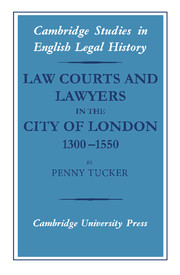Book contents
- Frontmatter
- Contents
- Acknowledgements
- List of abbreviations
- List of figures
- Introduction
- 1 The administration of the law by the city in context
- 2 The distinctiveness of city law and custom
- 3 The city law courts
- 4 The administration of the law in the city's courts: I
- 5 The administration of the law in the city's courts: II
- 6 Judges, jurors and litigants
- 7 The city's law officers
- 8 Legal representation in the city
- 9 The effectiveness of the administration of the law by the city
- 10 Interchange and exchange between the city and the common law
- Appendices
- Bibliography
- Index
7 - The city's law officers
Published online by Cambridge University Press: 04 August 2010
- Frontmatter
- Contents
- Acknowledgements
- List of abbreviations
- List of figures
- Introduction
- 1 The administration of the law by the city in context
- 2 The distinctiveness of city law and custom
- 3 The city law courts
- 4 The administration of the law in the city's courts: I
- 5 The administration of the law in the city's courts: II
- 6 Judges, jurors and litigants
- 7 The city's law officers
- 8 Legal representation in the city
- 9 The effectiveness of the administration of the law by the city
- 10 Interchange and exchange between the city and the common law
- Appendices
- Bibliography
- Index
Summary
INTRODUCTION
This chapter examines developments in the city's law offices. Whether or not any of the city's law officers presided over the city courts during our period, their characteristics, too, will have had an impact on the character of the courts in which they worked. At the beginning of our period, in 1300, there were probably no law officers: meaning, men employed by the city specifically for their legal expertise. By the end, in 1550, there were four (and not only had several common clerks trained as common lawyers, but one had recently quitted office on his creation as a serjeant at law). They were the recordership, the common serjeanty, and the two undershrievalties of London.
London was well ahead of other English cities and towns in establishing law offices which were distinct from its clerkships. Since no other borough was a county before 1373, when Bristol was granted that privilege, and therefore only London had its own sheriff before that date, naturally no other borough had undersheriffs before 1373 either. More surprising is that recorderships were still very rare in 1400; and there appear to have been no other common serjeanties in our period. The first mention of a recorder in the records of Bristol, which was the leading provincial city at the beginning of our period, occurs in 1344, although the office may have been introduced in the 1330s.
- Type
- Chapter
- Information
- Law Courts and Lawyers in the City of London 1300–1550 , pp. 240 - 271Publisher: Cambridge University PressPrint publication year: 2007



